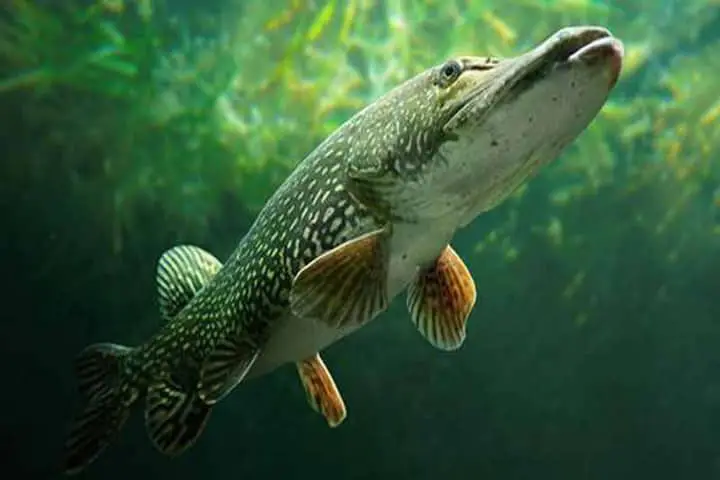

A new research brought to light that if mercury pollution is reduced, their concentration in fishes like pike also comes down (Pic. Courtesy Twitter/@fisheriesaqua)
<p>
<strong>In what can be described as an optimistic and positive finding, scientists in a new study have gathered that the population of fish can stage a fast comeback if pollution due to mercury is stopped in their ecosystem. This has been reported in New Scientist as per an article in smithsonianmag.com.</strong></p>
<p>
In a study which spanned across 15 years, scientists in Canada measured the effects of mercury pollution on a lake and also on those living in it. They allowed mercury into this lake — which is experimental and kept separate purely for research — for the initial seven years. This was done by adding mercury into the water or at the upland areas where it would get washed into the lake. The next eight years were used to check how the ecosystem made a recovery.</p>
<p>
Pollution due to mercury is a perpetual problem and the finding about the quick comeback of fish numbers is good news for groups that depend on fisheries.</p>
<p>
<strong>Also read: <a href="https://www.indianarrative.com/science-news/pacific-bully-lingcod-loses-and-grows-teeth-everyday-to-feed-like-a-pig-128916.html">Pacific lingcod-a predatory fish with 500 teeth to feed its huge appetite</a></strong></p>
<p>
When the mercury reaches the water, it is converted into a more lethal form called methylmercury by microorganism. After the passage of three years when the scientists had stopped the addition of mercury, it was found that the methylmercury concentration in the water dropped by 81 per cent. At the end of the 15 years, the concentration in fishes came down. It dropped by 38 per cent in lake whitefish, 76 per cent in pike and 85 per cent in small fish, according to a report in Popular Science.</p>
<p>
The findings have been published in the journal Nature recently.</p>
<p>
The lead author Paul Blanchfield, talking to New Scientist remarked: <a href="https://www.smithsonianmag.com/smart-news/fish-can-recover-surprisingly-quickly-from-mercury-pollution-180979268/?utm_source=smithsoniandaily&amp;utm_medium=email&amp;utm_campaign=20211220-daily-responsive&amp;spMailingID=46136420&amp;spUserID=MTI4MDgxMTczNjcwMgS2&amp;spJobID=2142287410&amp;spReportId=MjE0MjI4NzQxMAS2">&quot;I can&rsquo;t imagine a much</a> faster recovery.&rdquo; He is a research scientist at Fisheries and Oceans Canada.</p>
<p>
While the chemical element Mercury occurs naturally in the Earth, human activities like mining of gold and fossil fuel burning has increased mercury pollution in the planet. On reaching water, and getting transformed into methylmercury, it can lead to build up in creatures like shellfish, fish and in turn in those beings who eat these organisms, including human beings.</p>
<p>
The Environmental Protection Agency informs that almost everyone in the planet has some traces of methylmercury in their body.</p>
<p>
Sharing details, Blanchfield said: &quot;[Methylmercury] tends to increase with every step in the food chain. The fish at the top of the food chain are the ones we humans eat, and they have the highest concentrations of methylmercury&mdash;often up to a million times higher than in [the surrounding] water.&quot;</p>
<p>
On examining the samples of tissues, the researchers found that there was not much change in the individual fish&rsquo;s mercury levels. Blanchfield told Popular Science: &ldquo;However, when we looked at the entire population, we saw that it was declining quite rapidly.&rdquo;</p>
<p>
<strong>Also read: <a href="https://www.indianarrative.com/science-news/contrary-to-belief-study-suggests-that-male-squids-are-concerned-parents-113933.html">Contrary to belief, study suggests that male squids are concerned parents!</a></strong></p>
<p>
The proof gathered from the study points that the young fish led the recovery. The predatory pikes topped the concentration of mercury when the scientists stopped adding mercury, however, at the population level, their concentrations came down two times faster than those of other large fish, the whitefish. The reasoning for this difference probably is due to the fact that pike reproduce faster and don&rsquo;t live long as compared to the whitefish, hence the build-up of methylmercury was not much in young pike, according to New Scientist.</p>
<p>
In a Press release, the study&rsquo;s co-author, Brian Branfireun remarked: &quot;These scientific advances will allow policymakers, resource managers and communities dependent on subsistence fishing to make better lake-specific predictions about the magnitude and timing of mercury reductions.&rdquo;</p>
<p>
Branfireun is an environmental scientist at Western University in Canada.</p>
Australia's High Commissioner to India, Philip Green OAM, called Yoga one of India's gifts to…
The Bharat Sanchar Nigam Limited (BSNL) has announced the soft launch of BSNL Quantum 5G…
The Indian Embassy in Iran has said that the embassy will make efforts to evacuate…
India's gross direct tax collections for the financial year 2025-26 rose by 4.86 per cent…
Russian President Vladimir Putin has said that Moscow is not seeking Ukraine's unconditional surrender, but…
Extending his greetings on the 11th International Day of Yoga, Lok Sabha speaker Om Birla…